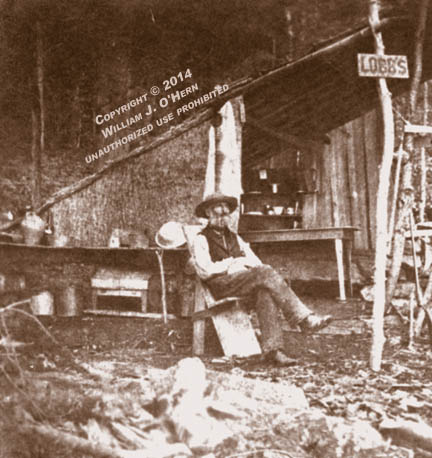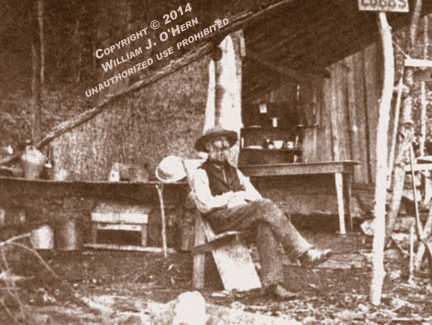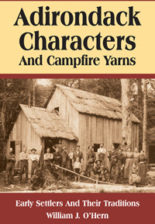AMONG THE RUGGED, eccentric woodsmen who wove their lives into the North Woods, Floyd Ferris Lobb, the hermit of Piseco lake, was unique.

Adirondack Characters And Campfire Yarns
“Old Lobb,” the hermit of Piseco Lake
An excerpt from ” Adirondack Characters And Campfire Yarns “, Starting on page 33

A postcard of Floyd Ferris Lobb, commonly known as “Old Lobb,” the hermit of Piseco Lake.
COURTESY EDWARD BLANKMAN (THE LLOYD BLANKMAN COLLECTION)
Old Men of the Mountains
Mortimer Norton believed Adirondack characters should not be forgotten and that accounts of their lives and exciting adventures should be repeated over and over again. He believed the younger generation should learn about the old-time characters like New York State frontiersmen Nat Foster, Jonathan Wright, and Nick Stoner. Canadian “French” Louie who lived on Big West Lake would have been included. The story “Old Lobb of Piseco” is one of Mortimer’s stories born of his experience, knowledge and research.
OLD LOBB OF PISECO LAKE
Mortimer Norton
AMONG THE RUGGED, eccentric woodsmen who wove their unusual, sometimes turbulent, lives in the North Woods of New York in an early era, Floyd Ferris Lobb was one of the most unique. The events that occurred during his latter days form an interesting chronicle of the wilderness.
Without any intention on his part, the activities in which Lobb engaged while staying alone on the westerly shore of Piseco Lake, couched in the dense forest of southern Hamilton County, notably influenced numerous sportsmen who invaded the Adirondack Mountains to test their skill at trout fishing.
This impression, rife to some extent even at present, came about because Lobb, goaded either by the impulse to invent or the necessity to appease his recurring hunger, devised a trolling spoon that, in brass, copper, and nickel finishes, was highly appealing to lake trout.
To the fish, its shape, size, and color apparently resembled a golden or silver shiner – two species of minnows prevalent in the lake then and which the trout prized as food – when twitched through the water At any rate, the spoon readily proved to be the most alluring of all those used in the region, and certainly resulted in exceptional catches for the bewhiskered old-timer.
Naturally, visiting anglers became aware of this phenomenal spoon, despite every furtive attempt in the beginning by Lobb to hold it a secret. Their curiosity was aroused to a sharp pitch; they were anxious to try it out themselves, and to have a few safely stashed in their own tackle boxes for frequent trials. Several fortunate fishermen did manage somehow to obtain samples, and thus inevitably the fame of Lobb’s pet trout teaser at length spread far and wide. n view of this notoriety, more people began to hear of “the hermit of Piseco Lake,” and to wonder from whence he had come and why he chose to seclude himself from society.
Being extremely reticent, and almost totally deaf after middle age, Lobb would confide in very few acquaintances and had scarcely any personal friends. He refused to divulge much about the incidents that took place in his boyhood years. As far as the residents and summer vacationers around Piseco were concerned, most of his life was shrouded in an impenetrable mystery. And so it remains!
Nearly everyone who came into contact with the veteran trapper, hunter, and fisherman knew him solely as “Old Lobb.” Just where and when he was born, no one could seem to discover beyond that he started life “somewhere in Pennsylvania” at a date probably between 1820 and 1825, and that his parents came from Connecticut.
Stirred by the adventurous tendencies of the pioneer and wanderlust, in his late teens or early twenties young Lobb departed from home, traveled northward, and finally arrived in the cozy village of Poland, a few miles south of the Adirondacks in the scenic and historic West Canada Creek Valley.
Here, it has been told, he opened a small tailor shop to earn a livelihood, and exercised his talents as a musician and writer. On weekends when lumberjacks and other mountaineers drifted into town to drink away their wages, Lobb might be found listening raptly to exciting tales of the North Woods.

These whetted his yearning to partake altogether in an outdoor life, a feeling that was intensified when he heard repeatedly about the wild game – panthers, deer, black bear, foxes, bobcats, beaver, fisher, pine marten, otter, raccoons, snowshoe rabbits, and gray squirrels-that thrived in the region about Piseco. He longed to hunt and trap these animals, to explore seldom-trod tracts of forestland, and to fish in lakes and streams that abounded with trout of huge proportions.
The opportunity to fulfill these desires came to pass sooner than he could have foreseen, and in a way that was hardly expected. A part of his youth, it seems, was enlivened by a wife, but in some manner there arose adverse marital problems that greatly changed the course of his career. It is reported, at least, that “when about twenty-four years of age, disappointed in love, or for some reason best known to himself, Lobb retired to Piseco Lake, where he lived as a hermit until his death in 1891.”